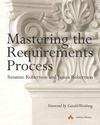jody@computer.org
jody@computer.org |
|
| Title: | Requirements Engineering |
| Institution: | Metropolitan State College of Denver |
| Course ID: | CSI 390J |
| Semester [CRN]: | Fall 2002 (08/19 - 10/12) [54563] |
| Meeting Times: | Tuesdays and Thursdays, 7:00PM - 9:45PM |
| Location: | SI 228 |
| Credit Hours: | 3 |
| Official Info: | This course has as prerequisite CSI 4250 or permission of department. |
| Course Website: | http://www.jodypaul.com/cs/reqeng |
| Instructor: | Dr. Jody Paul (schedule) |
| E-mail: | jody@computer.org |
| Office: | Science 134D (x68435) |
| Office Hours: | Tuesdays and Thursdays 4PM–5PM & 6PM–7PM |
| Campus Mail: | Campus Box 38 |
|
This course develops competency in software requirements engineering and management. Participants will gain knowledge and experience with requirements elicitation, explication, validation, management and assessment. We will also examine the pragmatics of integrating these practices into existing software development environments, with emphasis on the organizational and cognitive perspectives. During the course we will discuss provocative ideas concerning communication, ambiguity, cost/benefit analyses, alternative life-cycle models, negotiation and ways to address common difficulties encountered during software requirements engineering. Participants will locate, critically review and use outside resources related to the domain. |
Upon successful completion of this course, you will be able to:
|
Texts: Exploring Requirements: Quality Before Design
(Tattered Cover; Amazon)
by Donald C. Gause & Gerald M. Weinberg
Dorset House (1989)
ISBN 0-932633-13-7
REQUIRED

Mastering the Requirements Process
(Tattered Cover; Amazon)
by Suzanne Robertson & James Robertson
ACM Press / Addison-Wesley (1999)
ISBN 0-201-36046-2
REQUIRED

Software Requirements Engineering, Second Edition
(Tattered Cover; Amazon; IEEE)
edited by Richard H. Thayer & Merlin Dortman
IEEE Computer Society Press (1999)
ISBN 0-8186-7738-4
RECOMMENDED

Articles, Technical Reports, Journals & Conference Proceedings
Sample publications include:
IEEE Software
IEEE Transactions on Software Engineering
Communications of the ACM
IEEE Computer
ACM SigSoft Software Engineering Notes
Alan Davis’ Requirements Bibliography
Proceedings of IEEE International Symposia on Requirements Engineering (e.g., 1999, 2002)
Requirements Engineering Journal
Doctoral Theses (e.g., re.theses.html)
Computing/Connectivity:
You must have World Wide Web access and an active e-mail account.
Note that you receive an e-mail account and Internet access by virtue of being a student at MSCD.
(See: http://www.mscd.edu)
You are encouraged to make use of electronic mail to contact me often: jody@computer.org
You must have access to a computer that provides tools for document preparation and for authoring and editing graphics.
|
You are expected to make several in-class presentations and to participate
in class discussions and in-class exercises. There will be homework assignments
that you are required to complete and turn in. Your final course grade
is determined by combining scores on the exercises, presentations, and
assignments. You are guaranteed a grade no lower than that given by the
following conversion of score (percentage of total possible) to letter
grade: N.B.: Participation in class discussions and exercises is mandatory. Late assignments will not earn course credit. You may submit an assignment after its due date for comments and advice, and you are encouraged to do so. However, the score for that assignment will be recorded officially as 0. Likewise, missing an in-class exercise will result in a score of 0 for that exercise. Specifically, late homework and make-up exercises will not be accommodated without prior arrangement and written agreement. Unforeseeable crises and emergency situations will be dealt with on a case-by-case basis in accordance with MSCD, College, and Departmental policies. Note that a substantial amount of information will be disseminated during class sessions or on course websites that you will be responsible for knowing whether or not you attended the sessions or accessed the website. Note in particular that the textbooks do not provide all of the information necessary to successfully complete the assignments and exercises. The work you turn in must be your own, created by you individually. Collaboration and discussion with fellow students concerning course information, materials, proof reading, concept exploration and studying for exams is encouraged. However, work you turn in must reflect your individual effort to provide fair assessment for grading and maximized benefit from the learning experience. Turning in work that is the result of unauthorized collaboration or copying will be treated as academic dishonesty and an attempt at fraud. All incidents of suspected dishonesty will be reported to the department and the Dean of the college. Consequences may include a grade of 0 on the assignment or exam, a grade of "F" for the course, academic probation, or dismissal from the institution. This is a very serious matter and should not be taken lightly. If you have any uncertainty or concerns, please discuss them with your instructor or advisor. |
The college policy on Class Attendance on Religious Holidays is posted on the information board outside the Mathematical and Computer Sciences department office (SI141). In addition, copies of this policy are available from the department upon request. It is the students' responsibility to understand and abide by the policy.
Students desiring a reasonable accommodation under the ADA must contact the instructor immediately to discuss their needs. Failure to notify the instructor, in a timely manner, of the need for a reasonable accommodation may hinder the college's ability to assist students in successfully completing the course.
©2002 Dr. Jody Paul